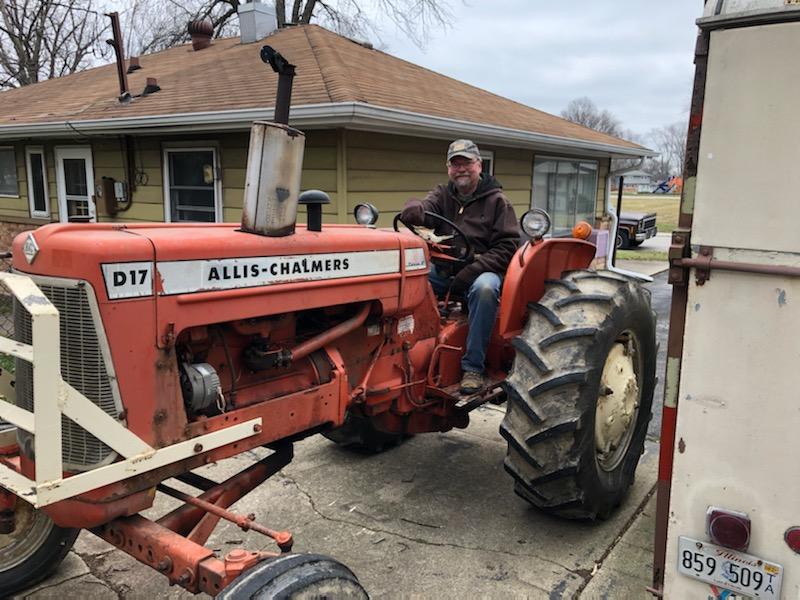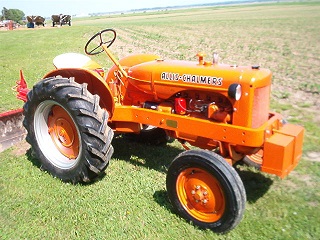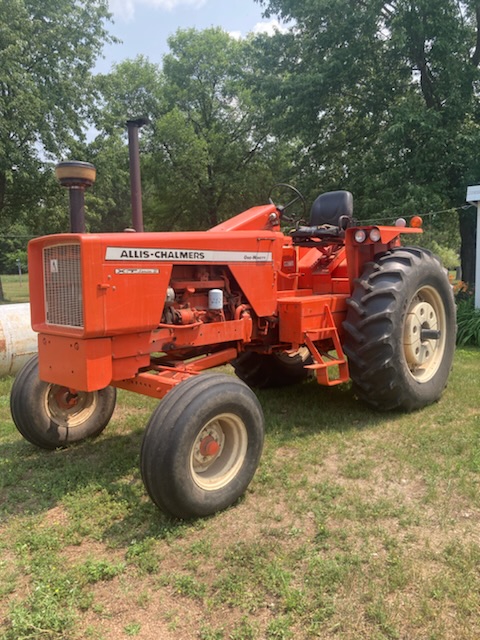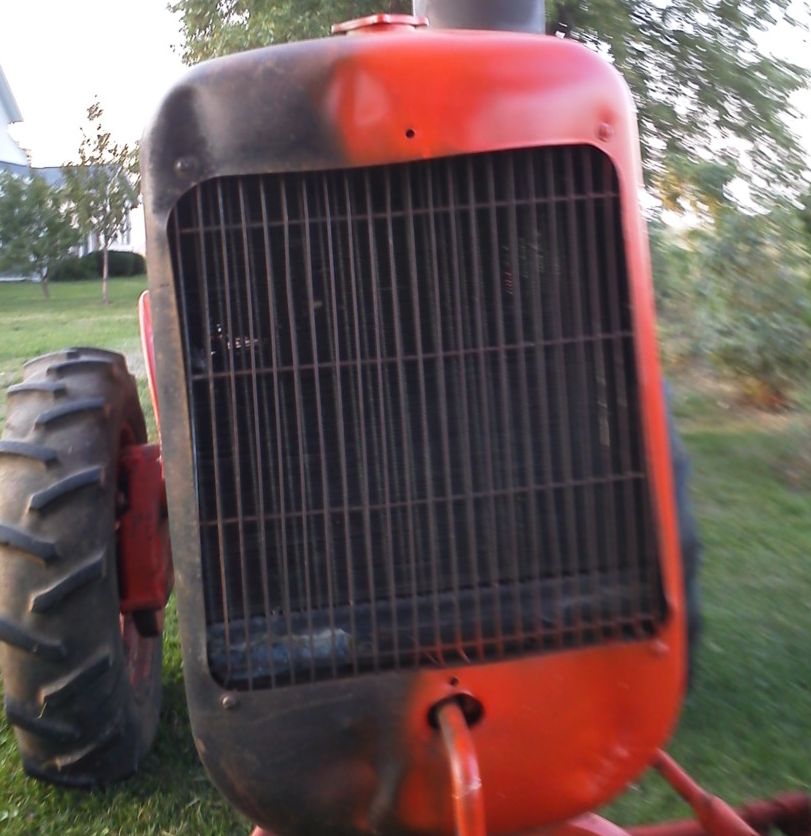| Author |
 Topic Search Topic Search  Topic Options Topic Options
|
GSTROM99 
Silver Level


Joined: 12 Dec 2020
Location: Greene, IA
Points: 246
|
 Post Options Post Options
 Thanks(0) Thanks(0)
 Quote Quote  Reply Reply
 Topic: Lead Substitute? Topic: Lead Substitute?
Posted: 17 Mar 2024 at 7:40am |
Does anyone/everyone use some sort of lead substitute additive in their gas tractors?
I do, just to be safe. I also put a jar of zink additive in the oil with every oil change.
|
 |
|
Sponsored Links
|
|
 |
steve(ill) 
Orange Level Access


Joined: 11 Sep 2009
Location: illinois
Points: 88649
|
 Post Options Post Options
 Thanks(0) Thanks(0)
 Quote Quote  Reply Reply
 Posted: 17 Mar 2024 at 8:42am Posted: 17 Mar 2024 at 8:42am |
|
I bought a new F250 in 1989... Illinois had already changed to 10% ethanol and no lead.... that was 35 years ago... Have had 3 trucks over 200,000 and recent truck has 95,000 ... mowers, chainsaw, tractor, hoe.. EVERYTHING has run without lead and has alcohol for over 35 years. ( my house / Illinois).
|
|
Like them all, but love the "B"s.
|
 |
Codger 
Orange Level


Joined: 23 Dec 2020
Location: Utopia
Points: 2458
|
 Post Options Post Options
 Thanks(0) Thanks(0)
 Quote Quote  Reply Reply
 Posted: 17 Mar 2024 at 9:01am Posted: 17 Mar 2024 at 9:01am |
I have several older engines. I use conventional pump gas, (10% ethanol) and have never had a valve recession problem over the years. Car has 305K on it, pickup is pushing 200K.
Using a zinc additive in the oil is not bad IMO. I use Rotella engine oil in my diesel engines as it still has adequate zinc content and the engine(s) have solid tappets. Same thing in any engine without roller tappets.
Biggest problem with the small and infrequently run engines is the fuel going stale from not being burnt. This more readily clogs fuel systems and parts than gasoline and diesel prior to the safety, and environmental nazis getting their way.
Correction as I can't type apparently. Truck has 269,830 miles at this writing. Nothing I have burns oil although a couple of engines seep about a pint between 5K oil changes which I'm very routine at.
Edited by Codger - 17 Mar 2024 at 10:15am
|
|
That's All Folks!
|
 |
Dave (NE) 
Orange Level

Joined: 12 Sep 2009
Location: Eagle Nebraska
Points: 2157
|
 Post Options Post Options
 Thanks(0) Thanks(0)
 Quote Quote  Reply Reply
 Posted: 17 Mar 2024 at 9:11am Posted: 17 Mar 2024 at 9:11am |
|
Do you use Rotella in your gas engines? I was told by local mechanic to use it, but was wondering what others are doing. How about in small engines such as lawn mower, 4-wheeler, etc.? Dave
|
|
Do not argue with an idiot. He will drag you down to his level and beat you with experience. Mark Twain.
|
 |
Codger 
Orange Level


Joined: 23 Dec 2020
Location: Utopia
Points: 2458
|
 Post Options Post Options
 Thanks(0) Thanks(0)
 Quote Quote  Reply Reply
 Posted: 17 Mar 2024 at 9:21am Posted: 17 Mar 2024 at 9:21am |
|
I use it in near everything but it's purchased by the barrel and a good friend is the vendor so reasonable in price, (comparatively). 10W-30 in the gas engines, and 15W-40 in the diesels.
|
|
That's All Folks!
|
 |
jaybmiller 
Orange Level Access

Joined: 12 Sep 2009
Location: Greensville,Ont
Points: 24786
|
 Post Options Post Options
 Thanks(0) Thanks(0)
 Quote Quote  Reply Reply
 Posted: 17 Mar 2024 at 9:33am Posted: 17 Mar 2024 at 9:33am |
|
I've got about 80 Cdn quarts of 10w40 here, pre1980 version.....
|
|
3 D-14s,A-C forklift, B-112
Kubota BX23S lil' TOOT( The Other Orange Tractor)
Never burn your bridges, unless you can walk on water
|
 |
HudCo 
Orange Level


Joined: 29 Jan 2013
Location: Plymouth Utah
Points: 3952
|
 Post Options Post Options
 Thanks(0) Thanks(0)
 Quote Quote  Reply Reply
 Posted: 17 Mar 2024 at 10:07am Posted: 17 Mar 2024 at 10:07am |
|
a customer called me last week and asked where to get more lead substitute for his dads 530 jd i told him just to use e10 , he was worred he was going to fry the valves , i think the big problem with e10 is when you change from non ethonal to the e10 and back on fouling up fuel systems. i use e10 i have no problems , only one exception is my snowmobiles use 91 non ethonal
|
 |
Dave (NE) 
Orange Level

Joined: 12 Sep 2009
Location: Eagle Nebraska
Points: 2157
|
 Post Options Post Options
 Thanks(0) Thanks(0)
 Quote Quote  Reply Reply
 Posted: 17 Mar 2024 at 10:29am Posted: 17 Mar 2024 at 10:29am |
|
Yeah, I haven't been able to find lead substitute in years. Even my google searches do not turn up the stuff I had been using. There was a discussion on lead substitute on the forum some time back. The conclusion seemed to be, that it was not necessary. I'd use it, if I could still find it, just to be cautious.
|
|
Do not argue with an idiot. He will drag you down to his level and beat you with experience. Mark Twain.
|
 |
Codger 
Orange Level


Joined: 23 Dec 2020
Location: Utopia
Points: 2458
|
 Post Options Post Options
 Thanks(0) Thanks(0)
 Quote Quote  Reply Reply
 Posted: 17 Mar 2024 at 10:45am Posted: 17 Mar 2024 at 10:45am |
 Dave (NE) wrote: Dave (NE) wrote:
Yeah, I haven't been able to find lead substitute in years. Even my google searches do not turn up the stuff I had been using. There was a discussion on lead substitute on the forum some time back. The conclusion seemed to be, that it was not necessary. I'd use it, if I could still find it, just to be cautious. |
The largest concern was valve recession into the heads as the lead offered a slight cushioning effect to the engine valves slamming home. Manufacturers are now hardening their valve seats, or installing hard seats into the softer castings to eliminate this phenomena. Most high performance engines well into the 50's and 60's had hardened seats when built. Easy enough to cut a head to install hard seats also if it were ever a problem but isn't near as prevalent of a problem as it was in the early 80's once the 60's and 70's engines had accumulated a lot of miles/usage upon them.
Lot of benefits to the lead being gone from fuels too. Less carbon fouling of plugs, less burned valves, etc. How many 70's engines before the advent of modern fuel injection could be relied upon to deliver 200K miles? Not a lot of them but although there is a lot of bad out there, there is also a lot of good with the technology now in place.
Kind of a pain in the backside to drill down to fault with electronics too.....
|
|
That's All Folks!
|
 |
Travis2766 
Silver Level


Joined: 26 Aug 2015
Location: Amherst, Wi
Points: 439
|
 Post Options Post Options
 Thanks(0) Thanks(0)
 Quote Quote  Reply Reply
 Posted: 17 Mar 2024 at 4:02pm Posted: 17 Mar 2024 at 4:02pm |
|
Seafoam, in the gas and the oil. Gas is always non ethanol (premium or mid grade). I never put gas with ethanol in the tractors or any small engine.
|
|
190XT Series III, D17 Series IV, D15 Series II, All Crop 66, Rotobaler.
|
 |
GSTROM99 
Silver Level


Joined: 12 Dec 2020
Location: Greene, IA
Points: 246
|
 Post Options Post Options
 Thanks(0) Thanks(0)
 Quote Quote  Reply Reply
 Posted: 17 Mar 2024 at 9:20pm Posted: 17 Mar 2024 at 9:20pm |
|
I do use Rotella oil in my tractors, add a bottle of zink too, and still have a quart of lead substitute to use in the Allis. I use regular non-ethanol gas (with Sta-Bil) in the small engine stuff I have. Non-ethanol premium for the chainsaws. E-15 in my '19 Jeep.
Edited by GSTROM99 - 17 Mar 2024 at 9:21pm
|
 |
darrel in ND 
Orange Level


Joined: 22 Nov 2009
Location: Hebron, ND
Points: 8740
|
 Post Options Post Options
 Thanks(0) Thanks(0)
 Quote Quote  Reply Reply
 Posted: 18 Mar 2024 at 5:51am Posted: 18 Mar 2024 at 5:51am |
|
Right, wrong, or indifferent, I put about a cupful of marvel mystery oil per 20 gallons of gas into my gas tractors. And always non-ethanol gas. That mostly because a lot of times, on the tractors I don't use a lot, might take 6 months to use a tank ful of gas. Darrel
|
 |
WF owner 
Orange Level

Joined: 12 May 2013
Location: Bombay NY
Points: 5060
|
 Post Options Post Options
 Thanks(0) Thanks(0)
 Quote Quote  Reply Reply
 Posted: 18 Mar 2024 at 6:50am Posted: 18 Mar 2024 at 6:50am |
I use premium, non-ethanol in my tractors. The reason is, since I don't farm, I seldom go through over 10-20 gallons of gas per year in any tractor. If I was using them constantly, I would have no problem using 10% ethanol. I just don't feel that the ethanol based gas stores well. For the past 15 years, I have used a Massey Ferguson GC2400 (diesel) with a 60" mower deck for my lawn. I am thinking of a gas powered zero turn this year. If I do, I will run ethanol until fall, then switch to premium for the last few mowings, to get the ethanol fuel burned out before winter storage.
|
 |
Codger 
Orange Level


Joined: 23 Dec 2020
Location: Utopia
Points: 2458
|
 Post Options Post Options
 Thanks(0) Thanks(0)
 Quote Quote  Reply Reply
 Posted: 18 Mar 2024 at 7:14am Posted: 18 Mar 2024 at 7:14am |
I usually start my small engines numerous times over the months they are not used to keep fuel moving through them. Ethanol based fuels do not store well I agree. I have several antique Mack trucks which are diesel and all have "Howes" additive in the fuel and they store well. Several were started just last week after a several year nap and didn't give problems.
This year I've had storage tanks for gasoline, and diesel given to me along with a pump so will be bulking fuels. I need to rinse the gasoline barrel yet and it's gravity feed on a stand. The diesel tank is pump fed with a "GasBoy" electric pump and I have red premium diesel in it working well. The gasoline barrel will have ethanol free gasoline which I believe it contains a bit of now, but no history other than several years old.
|
|
That's All Folks!
|
 |
DaveKamp 
Orange Level Access


Joined: 12 Apr 2010
Location: LeClaire, Ia
Points: 6091
|
 Post Options Post Options
 Thanks(0) Thanks(0)
 Quote Quote  Reply Reply
 Posted: 18 Mar 2024 at 10:19pm Posted: 18 Mar 2024 at 10:19pm |
I have guys trying to jeer me with this same thing when I drive my '24 T and '29 A to the pump.
There is absolutely NO reason justifying the use of leaded gasoline in an industrial engine, the Allis included... and pre WW2 engines don't need it, either.
The only engines subject to valve problems from LACK of lead, are low-quality non-industrial engines that have plain (raw iron... no insert) valve seats... typically, they're between 1949 and 1970, and automotive.
Realize... TetraEthyl Lead (TEL) wasn't introduced to domestic (non-military) markets in any significant volume until AFTER WW2.
Manufacturers (Especially Ford) found that, with TEL being a pretty much 'standard' fuel after WW2, they could save manufacturing cost by using cheaper valves and omitting hardened inserts from their postwar flathead V8, and other engines. As a result of wartime aircraft and marine engine development, manufacturers also recognized that they could get 'more free power' out of a generally poor engine design simply by advancing the ignition... as long as preignition didn't occur. TEL would reduce that, so a manufacturer could boast another 10-15hp from the same engine, simply by specifying 'high-test leaded fuel', and advising that if one didn't they'd simply have to retard the ignition.
Did all engines prior to WW2 have hardened seats? Of course not... PRIOR to WW2, casual valve jobs (grinding, lapping, and adjustments in automotive engines every 12,000 miles were considered commonplace, so it wasn't a surprising thing... 12,000miles THEN, was viewed as a whole lot more than what we see NOW...
But in an agricultural or industrial setting, the load is significantly higher, which means higher running temperatures, higher stresses... hotter valves and head castings. In this circumstance, things like hardened seats and sodium filled valves were necessary, lest high maintenance and significant failure rates would cause farmers to abandon your product simply because it wouldn't last long under the agri/industrial duty cycle that automotive applications simply didn't require.
Now, to take it a step further, realize that TEL was not only unavailable before the end of WW2, industrial and agricultural engines PRIOR to WW2, and WELL AFTER, ran on plenty of other fuel types that had no TEL. Propane, natural gas (stationary power units), generated methane (digester gas), Distillate fuels... None had TEL. From the start, there was no provision for, thus no need intended... for lead.
So the answer is no- don't waste resources thinking it 'needs' lead.
Now that said... for flathead engines, running a little Marvel Mystery Oil in the fuel every so often does help clean tarry goo off the valve stems... but just on flatheads. Due to the poor flow and thermal problems inherent to the flathead design, carbon soot mixes with unburned fuel and a little oil loss, to accumulate on the stems and the valves start to stick. MMO cleans that crud out pretty well.
Zinc in the oil helps provide lubrication to flat tappets and cam lobes. The unfortunate removal of zinc from motor oils results in the classic flat design winding up abraded to heck pretty quick... so gotta have zinc. I converted three of my boat engines to roller-hydraulic lifters specifically to combat that issue, and I've rebuilt two others after the owners did oil changes WITHOUT realizing the new oil was insufficient for their flat tappet camshafts.
Edited by DaveKamp - 18 Mar 2024 at 10:25pm
|
|
Ten Amendments, Ten Commandments, and one Golden Rule solve most every problem. Citrus hand-cleaner with Pumice does the rest.
|
 |









 Topic Options
Topic Options


 Post Options
Post Options Thanks(0)
Thanks(0)




 Dave (NE) wrote:
Dave (NE) wrote:


